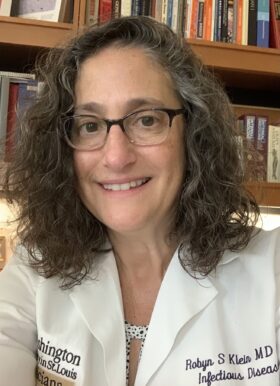
Robyn S. Klein, MD, PhD
The Robert E. and Louise F. Dunn Distinguished Professor of Medical Sciences, Departments of Medicine and Pathology and Immunology
- Phone: 314-286-2140
- Fax: 314-362-9230
- Email: rklein@nospam.wustl.edu
Robyn S. Klein, MD, PhD is the The Robert E. and Louise F. Dunn Distinguished Professor of Medical Sciences, Director of the Center for Neuroimmunology & Neuroinfectious Diseases, and Professor of Medicine, Pathology & Immunology, and Neurosciences at Washington University School of Medicine. She serves on the Advisory Board of the Academic Women’s Network and as mentor of junior faculty through the WUSM Family-Wise Mentoring Program. Dr. Klein is a Distinguished Advisory Board member of the Universal Scientific Education and Research Network (USERN), and the Rocket Science Health, Viral Neuro Exploration (VINEx) Initiative in Victoria, B.C. and Montreal, Quebec.
Dr. Klein is an internationally renowned neuroimmunologist who oversees a basic and translational science research program focused on the pathogenesis of neuroinfectious diseases of the central nervous system (CNS). Studies in the Klein laboratory focus on cellular and molecular mechanisms that orchestrate inflammation and define its impact on CNS function during both viral and autoimmune encephalitides. Work in the Klein laboratory has defined novel roles for cytokines and chemokines in the regulation of blood-brain barrier permeability to arboviruses, protective versus pathogenic leukocytes, and in mechanisms of neurologic sequelae of neurotropic and neurovirulent viral infections such as impaired learning and memory. These studies have contributed to our understanding of normal CNS immune surveillance and its relationship to the wide range in inflammatory patterns observed during neuroinflammatory diseases, and identified therapeutic targets, which is much needed in an era where there is little to offer patients with these diseases.
Dr. Klein currently provides follow-up care for patients after hospitalization for neuroinfectious diseases and accepts referrals of patients who have neurological infectious diseases at the Infectious Diseases Clinic.
- Professor, Departments of Medicine, Anatomy & Neurobiology, Pathology & Immunology
- Director, Center for Neuroimmunology & Neuroinfectious Diseases
- BA: Barnard College, Columbia University, New York, NY (1985)
- MS, Neuroscience: Albert Einstein College of Medicine, Bronx, NY (1990)
- PhD, Neuroscience: Albert Einstein College of Medicine, Bronx, NY (1993)
- Medical Degree: Albert Einstein College of Medicine, New York, NY (1993)
- Residency: Brigham & Women’s Hospital, Boston, MA (1996)
- Clinical Fellowship, Infectious Diseases: Massachusetts General Hospital, Boston, MA (1997)
- Research Fellowship, Infectious Diseases: Massachusetts General Hospital, Boston, MA (2000)
- American Board of Internal Medicine
- American Board of Internal Medicine, Subspecialty of Infectious Diseases
- B.A. cum laude, Barnard College, Columbia University, New York, NY (1985)
- Constance Van Wahl Prize for Excellence in Biology, Barnard College, Columbia University, New York, NY (1958)
- NIH-Medical Scientist Training Program, Albert Einstein College of Medicine, Bronx,NY (1987-1993)
- M.S. with distinction, Albert Einstein College of Medicine, New York, NY (1990)
- NIH K08 Clinical Investigator Award – NINDS (1998-2003)
- Claflin Distinguished Scholar Award, Harvard University, Boston, MA (2002)
- Dana Foundation Award for Neuroimmunology (2005)
- McDonnell Center Award for Cellular and Molecular Neurobiology (2007)
- Pfizer/Washington University Biomedical Award (2009)
- NIH Midwest Regional Center of Excellence (MRCE) for Bioterrorist and Emerging Infectious Diseases New Opportunity Award (2009)
- NIH MRCE Development Project Award (2010)
- Travel Award, Washington University School of Medicine, St. Louis, MO, AAMC Mid-Career Women Faculty Professional Development Seminar, Scottsdale AZ (2010)
- Academic Medical Leadership Program for Physicians and Scientists, Washington University School of Medicine and Barnes-Jewish Corporation Learning Institute, St. Louis, MO (2013)
- Elected member of International Advisory Board, International Society of Neuroimmunology (ISNI) (2016)
- Elected Chair of Gordon Research Conference series on Neuroimmune Communication in Health and Disease (2017-2023)
- Women Faculty Leadership Institute, Washington University, St. Louis, MO
- President, Academic Women’s Network, Washington University School of Medicine, St. Louis, MO (2017-2018)
- Board of Directors, Academic Women’s Network, Washington University School of Medicine, St. Louis, MO (2018-
- Fellow, Executive Leadership in Academic Medicine (ELAM) Program at Drexel University, PA (2019-2020)
- Distinguished Educator Award, Washington University School of Medicine, St. Louis, MO (2020)
- The Robert E. and Louise F. Dunn Distinguished Professor of Medical Sciences (2020)
- Chair, NIH Study Section, Clinical Neuroimmunology & Brain Tumors, NINDS (2020)
- Vasek, M.V., Garber, C., Dorsey, D., Durrant, D.M., Bollman, B., Soung, A., Yu, J., Perez-Torres, C., Frouin, A., Wilton, D.K., Funk, K., DeMasters, B.K., Jiang, X., Bown, J.R., Mennerick, S., Robinson, J.K., Garbow, J.R., Tyler, K.L., Suthar, M.S., Schmidt, R.E., Stevens, B., Klein, R.S. (2016). A complement-microglial axis is required for synaptic loss during virus-induced memory impairment. Nature 534(7608):538-43.
- Garber, C. Soung, A., Vollmer, L. L., Kanmogne, M., Last, A., Brown, J., Klein, R.S. (2019) T cells promote microglia-mediated synaptic elimination and cognitive dysfunction during recovery from neuropathogenic flaviviruses. Nat Neurosci. 2019 Aug;22(8):1276-1288.
- Klein, R.S., Voskuhl, R., Segal, B.M., Dittel, B.N., Lane, T.E., Bethea, J.R., Carson, M.J., Colton, C., Rosi, S., Anderson, A., Piccio, L., Goverman, J.M., Benveniste, E.N., Brown, M.A., Tiwari-Woodruff, S. K., Harris, T.H., Cross, A. H. (2017) Speaking out about gender imbalance in invited speakers improves diversity: an example in Neuroimmunology. Nat. Immunol. Apr 18;18(5):475-478 Recommended in F1000Prime